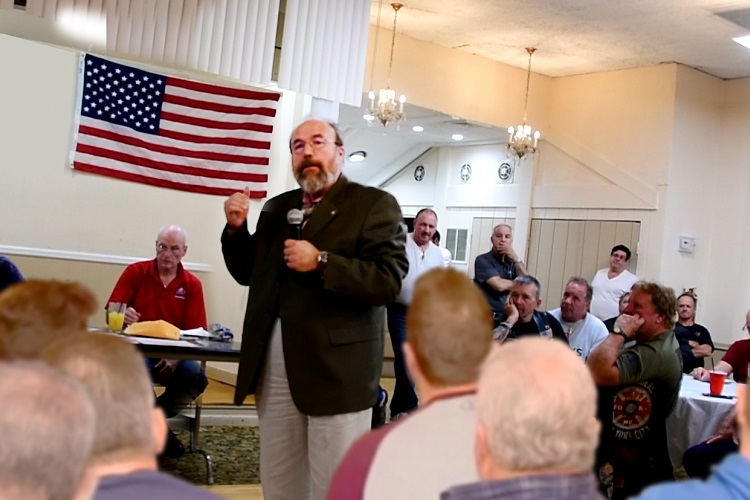
By Jesse A. Stoff
The New York Cancer Resource Alliance (NYCRA) presented its First Responders Cancer Awareness and Resource program at one of the largest Retired Member’s Association (RMA/Fire Department of New York) meetings this year. Earmarked by its giveaway button, “Get Checked Now!” (photo 1) has been an educational mantra to promote the proactive self‐care message for all 9/11 survivors and career rescue personnel.
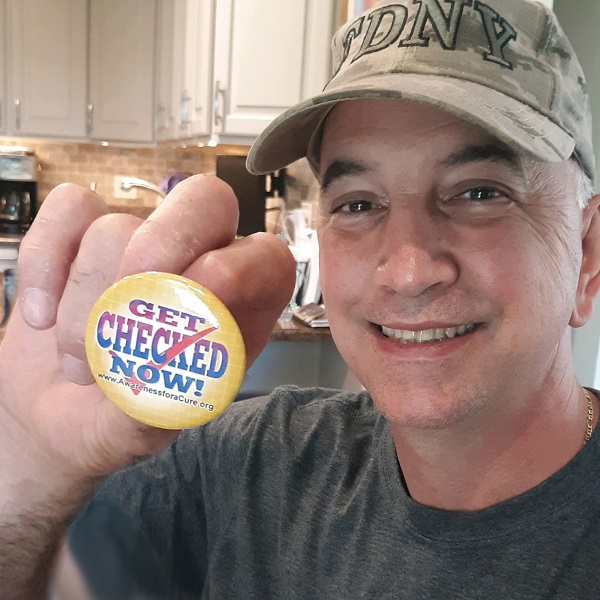
(1) Photos courtesy of author.
Founded in 1946, the RMA has been one of the largest national fraternal organizations dedicated to supporting the access of much needed information to all retired members. Former firefighter and senior awareness ambassador Sal Banchitta (photo 2) defined NYCRA’s curriculum as a “one-two punch,” the first being about current screening and diagnostics solutions and, second, a review of all treatment options. Banchitta stated, “We couldn’t think of a better event to bring out this heavy topic than RMA’s largest meeting of the year, nor a better doctor to deliver it.
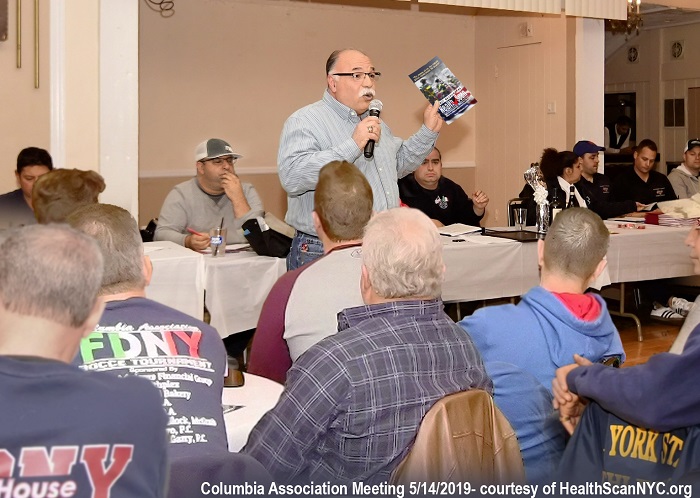
(2)
“This overview about cancer treatments carry the root message that “there’s a lot of smarter and safer choices out there to consider than ‘chemo and radiation.’ This alone is a life‐saving angle to opening people’s eyes for getting more insight as to what’s really available to us these days.”
Volunteer program developer Lennard Gettz was second on the mic and started off with the latest news headline quotes and mortality rates regarding the continuing rise in new cases that plague all responders. He also included other rare new findings such as male breast cancer cases that are (now) beginning to grow in numbers in the firefighter community. “I echoed the many advocates of 9/11 cancer victims who emphasize time as the most limited asset, and that’s what ‘Now’ means in the ‘Get Checked Now!’ slogan. Experience shows that there is rarely a warning as to who will get hit next, but when it does happen, your response time to addressing it is crucial. We can stay above the curve by thinking ‘prevention’ and subscribing to early detection exams.”
As a top cancer expert and integrative clinical immunologist, I was the NYCRA’s featured speaker and delivered a categorical “opening pitch” for this awareness 2.0 presentation (photo 3). I began, “Based off my experience with my patients, there is no one answer to cancer. That’s a very important take‐home message.
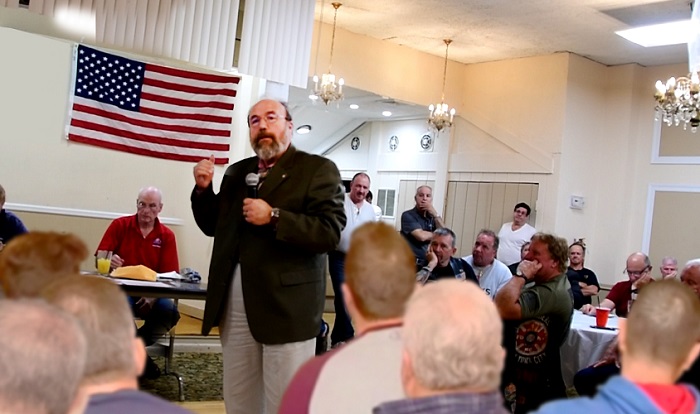
(3)
“If your doctor tells you that you’ve got cancer and presents the treatment program, well, that’s just not true. There are many different strategies for approaching and dealing with cancer. Yes, we have chemo, radiation, and surgery, and we’ve had them for decades, but other proven options like immunotherapy have been around for decades too, performing—in many cases—with lightning‐fast response, much less toxicity, and much better overall survival.”
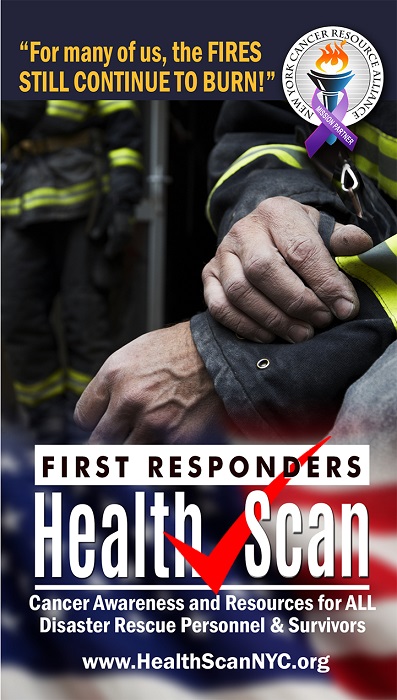 As cancer continues to plague the community of potentially at‐risk rescuers, the visiting health advocates from NYCRA were well‐received by the almost 200 attendees. The focus and attention from the generation of retired rescuers reflects on their concerns for looming health issues as new cancer cases and recent fatalities continue to hit the news each week. Retired Chief Bob Checco said, “In all of our meetings, after the pledge of allegiance, they would read off the list of firefighters passing away, and the list is getting longer all the time. We appreciate these speakers who are so dedicated to reminding us to get checked, especially the doctor (me) —they called him the ‘Cancer Encyclopedia’—he was so effective as a speaker with so much information for us. I haven’t seen any doctors ever come out to speak to our groups like this, not even with an appointment!”
As cancer continues to plague the community of potentially at‐risk rescuers, the visiting health advocates from NYCRA were well‐received by the almost 200 attendees. The focus and attention from the generation of retired rescuers reflects on their concerns for looming health issues as new cancer cases and recent fatalities continue to hit the news each week. Retired Chief Bob Checco said, “In all of our meetings, after the pledge of allegiance, they would read off the list of firefighters passing away, and the list is getting longer all the time. We appreciate these speakers who are so dedicated to reminding us to get checked, especially the doctor (me) —they called him the ‘Cancer Encyclopedia’—he was so effective as a speaker with so much information for us. I haven’t seen any doctors ever come out to speak to our groups like this, not even with an appointment!”
The First Responders Cancer Awareness group continues its schedule of presentations in firehouses and personnel meetings all across the New York area. As the medical expert and head writer for NYCRA’s review on cancer treatments, I continue to advocate for first responders in the new Cancer Awareness video podcast program, “So you think you know CANCER?” Here, I deliver an expanded review about the many cancer solutions available worldwide. In my professional opinion, unless you’re working with somebody who is aware of these kinds of breakthroughs and knows how to test for their use, then you’re going to be looking at old “off‐the‐shelf” generic therapies that can have much poorer overall survival, and that’s not what you want. My new cancer awareness video series is scheduled to launch in the Fall 2019.
I have worked with cancer patients for more than 30 years, and I have always worked with people that needed help in this area. Unfortunately, firefighters are exposed to a lot of chemicals, many of which are carcinogenic, and they are at much higher risk of getting cancer than other people. So, over a period of time, it was just natural for me to work with more and more people who are firefighters because of their exposure to these toxins and their eventual development of cancer.
There’s been a lot of research and study as to the range of toxins to which people were exposed and that they potentially absorbed as a result of 9/11. On one hand, many of these toxins are highly carcinogenic; they can initiate and trigger cancers. On the other hand, they’re immunosuppressive (suppressing the immune system and its response to cancer). So, these toxins are doing double damage to people to which they have been exposed.
Tests are available now, such as urine and blood, to see what toxins a person has absorbed and what toxins are still in their system. We also have ways of pulling these toxins out from different substances such as chelators, which can pull out heavy metals or volatile organic hydrocarbons. They can also pull out a lot of the things that can lead to cancer down the road. From a preventive point of view, it is very helpful to be put through these tests to see what toxins are still in the person. Coupling that with technologies like IvyGene™, the 4-D ultrasound, MRIs, and so on, to see what is “brewing” and what’s going on at a very early stage gives us the opportunity to intervene very effectively with minimal invasive treatments to help people prevent severe, life-threatening cancers.
Out of the Chernobyl disaster came an initial influx of thyroid cancer cases. Years later, the incidence of cancers dropped significantly. Now, we’re seeing the second wave of cancers from Chernobyl where we’re finding cancers of everything else because of all the radiation to which those people were exposed. The same sort of thing is now happening out of 9/11; a different toxic substance, but the same type of response by the body and the immune system to these toxins. I can’t stress enough how important it is to find out what’s in your body now and determine the structure and function of your immune system and how it protects you so you can deal with an abnormal issue that shows up in something as early as an IvyGene test.

The more we know in terms of different strategies for addressing cancer, the more options we have and, thus, the more hope we have. With the rapid research that’s occurring in the field of immunology and immune-oncology, many cancers can be treated with first-line therapies such as immune therapies instead of chemotherapies. For every pharmaceutical company talking about a new chemotherapy drug, you’ll find 10 talking about the latest immunotherapy drugs or other medicines that act as small-molecule therapies such as enzyme inhibitors—treatments that aren’t chemo but can still block the activity, growth, and life of cancer cells without having the high level of toxicity against normal tissue.
So, the old paradigm of “chemotherapy, radiation, and surgery” is being replaced by a more effective and much less toxic therapy; this is evolving before our eyes. I have therapies today that have put people in remission that, five years ago, would have carried a death sentence. To see these medicines now available and how they are changing the way we think about the field of oncology is magnificent. It’s an exciting time to be practicing in this field, and I very much enjoy it.
About
The New York Cancer Resource Alliance and the First Responders Cancer Resource are New York based-independent volunteer, self-funded advocacy organizations whose members are dedicated to the sharing of free-access information, educational materials about cancer, videos, group presentations, and a catalog of all cancer resources.
Web site: www.HealthScanNYC.org.
Media contact: nycralliance@gmail.com.
Phone: (631) 920-5757
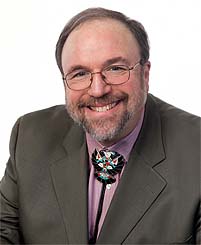 JESSE A. STOFF, MD, is the medical director of Integrative Medicine of New York in Westbury and an internationally renowned physician with extensive credentials in clinical immunology and holistic medicine. A graduate of New York Medical College, he pursued extensive postdoctoral training including a fellowship at the Royal London Homeopathic Hospital in London, England. Stoff has published more than nine books, including co-authoring the bestsellers Chronic Fatigue Syndrome: The Hidden Epidemic and The Prostate Miracle, and more than 250 articles on health and wellness. He has spoken worldwide at prestigious medical conferences about his experiences and analyses on the study of human disease. His recent publications include the magazine IMMUNOLOGY TODAY and the medical text INTEGRATIVE ONCO-IMMUNOLOGY, which is being distributed and accessed by medical colleges today.
JESSE A. STOFF, MD, is the medical director of Integrative Medicine of New York in Westbury and an internationally renowned physician with extensive credentials in clinical immunology and holistic medicine. A graduate of New York Medical College, he pursued extensive postdoctoral training including a fellowship at the Royal London Homeopathic Hospital in London, England. Stoff has published more than nine books, including co-authoring the bestsellers Chronic Fatigue Syndrome: The Hidden Epidemic and The Prostate Miracle, and more than 250 articles on health and wellness. He has spoken worldwide at prestigious medical conferences about his experiences and analyses on the study of human disease. His recent publications include the magazine IMMUNOLOGY TODAY and the medical text INTEGRATIVE ONCO-IMMUNOLOGY, which is being distributed and accessed by medical colleges today.

